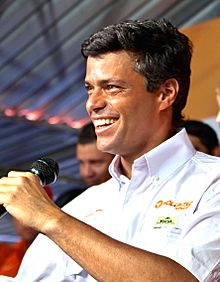Leopoldo López
| Leopoldo López | |
|---|---|

Leopoldo López
|
|
| National Coordinator of Voluntad Popular | |
|
Assumed office 5 December 2009 |
|
| Mayor of Chacao | |
|
In office 30 July 2000 – 9 December 2008 |
|
| Preceded by | Cornelio Popesco |
| Succeeded by | Emilio Graterón |
| Personal details | |
| Born |
Leopoldo Eduardo López Mendoza 29 April 1971 Caracas, Venezuela |
| Political party | Voluntad Popular |
| Spouse(s) | Lilian Tintori |
| Children | Manuela Rafaela López, Leopoldo Santiago López |
| Residence | Caracas |
| Alma mater |
Kenyon College Harvard University's Kennedy School of Government |
| Occupation | Economist |
| Religion | Roman Catholicism |
| Website | leopoldolopez.com |
Leopoldo Eduardo López Mendoza (born 29 April 1971) is a Venezuelan politician and, in the eyes of his supporters, a political prisoner. In 2000, López ventured into politics when he co-founded the political party Primero Justicia alongside Henrique Capriles Radonski and Julio Borges, and ran successfully for the mayorship of the Chacao Municipality of Caracas in the regional elections held in July 2000.
In 2004, Lopez was disqualified from holding public office for six years (beginning in 2008, at the completion of his term as mayor), as a result of administrative sanctions imposed by Venezuela's Comptroller's Office following an investigation into two corruption scandals involving alleged nepotism and misappropriation of funds. Opposition groups in Venezuela criticized these charges as fabricated. Lopez was never charged with a crime, tried, or allowed to rebut the allegations; Lopez sued Venezuela and his case was reviewed by the Inter-American Court of Human Rights, which issued a unanimous ruling in his favor, though the verdict was ignored by Venezuelan officials. López served as National Coordinator of Venezuelan political party Voluntad Popular, which he founded in 2009, until his imprisonment in 2014.
López called for peaceful protests in February 2014. He was arrested on 18 February 2014 and charged with arson and conspiracy; murder and terrorism charges were dropped. Human rights groups expressed concern that the charges may have been politically motivated. Opinion polls in late 2014 showed that López was among the most popular politicians in Venezuela. On September 10, 2015, he was found guilty of public incitement to violence through supposed subliminal messages, being involved with criminal association, and was sentenced to 13 years and 9 months in prison. His imprisonment was seen as controversial, and in October 2014 the UN High Commissioner for Human Rights called for the release of those arrested in connection with the protests.
...
Wikipedia
